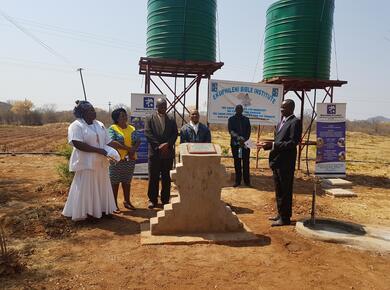Posted: December 3, 2020
“It started from small ambitions of a little heart,” says Sibonokuhle Ncube. As a child of 10 in Zimbabwe, “hearing that my parents couldn’t ever send enough money to help [my relatives] because whole village was hungry, I got ambitious in my dreams. When I grow up, I will be helpful.”
In both rural and urban Zimbabwe, the majority of households grow some of their own food. Changes in climate patterns are apparent to everyone. The droughts used to come every 10 years, then every five. “Now the droughts are back to back, across seasons. We are keenly aware of that,” she says.
Add in a global pandemic, and the situation is even more critical.
Church leadership in community
As with issues surrounding the coronavirus, the reasons for climate change are not always understood, says Sibonokuhle Ncube, and are often politicized. Political divisions result in actions that cause real harm.
Misgovernance and politicization of development can also affect how aid and resources flow from one region to another. “Apart from structural issues, [in Zimbabwe], we had civil unrest; structural, cultural and physical violence; displacement.”
Her studies and vocation have focused on development, peacemaking and climate finance governance in Zimbabwe where she has worked with government, NGO and faith-based agencies and INGOs.
“Targeting rural poverty via agricultural and water supply interventions was my first port of call. We work together with communities [affected by food insecurity] to co-create pathways to adequate provisioning.
“The church needs leaders who understand their local dynamics and are able to share transformative information from the pulpit. The body of Christ is richer – not just in spiritual knowledge, but a broad sharing of life skills,” she adds. For example, the church can promote ecological regeneration of common lands (caring for local forests, shared paddocks) in their community.
Hope comes from action
High level action is needed for climate response. In every age, there are issues that “call upon people of faith to truly walk in radical acts of discipleship. Climate response is one of those for us today. We need a prophetic stance against the forces that reproduce marginality.
“A vibrant climate response is multilevel. On the policy side: speak to people in power. Make financial provisions for innovation, mitigation, adaptation,” says Sibonokuhle Ncube. “Communities of faith must pray for people in power who control resources. We need to pray for those who have no sense of ecological responsibility.”
People can also participate in civil action. “Individuals and communities can do something within their realms. It stops us from being gripped by despair.”
Sibonokuhle Ncube advised the government of Zimbabwe in the lead-up to the Paris climate agreement in 2015. Some of the world powers’ commitments made there have not been upheld. Nevertheless, “I have chosen to stand on the side of hope and be acting from the bottom.”
“Our approach to working on climate response should be as concerted, coordinated, urgent and inter-generational as the attention we gave to HIV and AIDs,” she says.
An us perspective
For a deep and meaningful climate response, “we need to come to a round table as big as the earth’s circumference. We’re affected as humanity,” Sibonokuhle Ncube says.
“There is good value in not speaking from a polarized perspective one that has an us and them. I also look at things generationally.”
“I love to come from an embodied systems worldview where I ask all of us to view ourselves as beneficiaries of the carbon age. I invite communities to think about what we can do to change some of the ways we do development and economics. Corporate thinking unlocks resources, participation.”
Exercising global stewardship
She calls people of faith to consider justice and stewardship in their climate response. “The impact of our individual reductions may be minimal, yet we must consider how our excess carbon dependence causes discomfort on the other side of the world.
“The systems perspective brings Scripture to come alive. Communities that are disenfranchised by shifting climate due to our action are our neighbours (Matthew 25).
“We need to think deeply about what just transition look like. Global North or Global South – we all need to do something. We need to hold those in authority to account in ways that are theologically sound. We are not only a people who work in ways that are hidden, but are also able to speak truth to power, as many a Bible character has had to do.”
In face of natural disasters and the impact of shifting climate continuing in our future communities will need to be resilient, work with alternative energy, know how to communicate our ecological stewardship as part of our faith,” says Sibonokuhle Ncube.
Sharing gifts
For Mennonite World Conference, there is a lens of “sharing gifts.” “Life is a gift from God. He gives us gifts like the created order. We are responsible for looking after those gifts, bequeathing generations to come with better ecological gifts to ensure we share a better quality of life for posterity.”
“It’s my prayer that this generational thinking can help us reorient our minds: ask the Holy Spirit to reconfigure our spirits. Look at the world redeemingly through God’s eyes. Look at brothers and sisters and creation worldwide through God’s eyes.”
—Sibonokuhle Ncube (PhD), a member of Brethren in Christ Church Zimbabwe, is currently walking her peacebuilding journey through studies in theology, peace and sustainability at Anabaptist Mennonite Biblical Seminary, Elkhart, Indiana, USA. She is also a member of the MWC Creation Care Task Force.
Learn more about the MWC Creation Care Task Force:
Creation Care Task Force |
This article first appeared in Courier/Correo/Courrier October 2020. Click here to read other articles from this issue.
Updated 18 January 2021: year of Paris climate accord corrected.


Join the Conversation on Social Media
FacebookTwitterInstagramFlickrYouTube